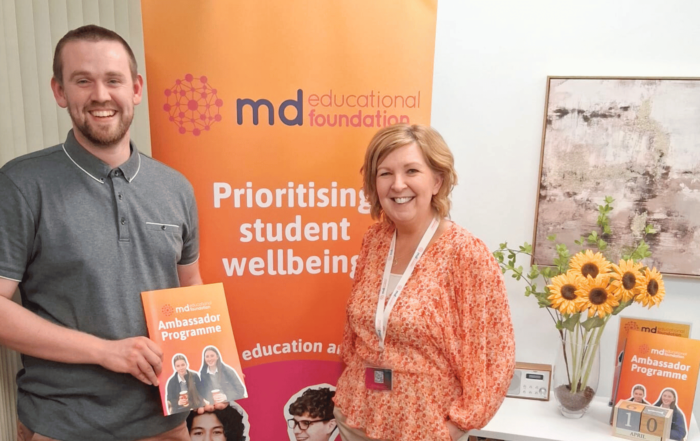Exam season has begun for GCSE, Junior Certificate, A-level and Leaving Certificate students. This can put a huge amount of pressure on young people, causing them to feel overwhelmed, anxious and alone.
The Childline National Exam Stress Survey revealed that 96% of 1300 responders felt anxious about exams, with 59% feeling pressure from their parents to do well and 64% saying they have never received any support on how to deal with them. According to NSPCC, There has also been a 10% increase in counselling sessions about exam stress since the pandemic.
Exam stress and test anxiety can have a negative impact on both the academic output and the mental health of students. According to the National Education Union, 82% of teachers in the UK believe exams have the biggest impact on their students’ mental health. This highlights how crucial it is to support students in understanding and managing their stress by providing preparation guidance and self-care strategies.
This blog talks about the impact that exam stress can have on young people’s mental health and wellbeing and provides advice on how to recognise it. Read on to hear what young people have to say about exam stress and its impact on them, as well as to gain practical stress management tips and workshop ideas from wellbeing professionals.
What is exam stress, and what kind of impact does it have?
Stress is a natural reaction that we experience in our mind and body as a result of everyday challenges. It’s not an illness but a reaction to our life experiences. Some stress can be beneficial in helping us push through tricky situations, but at times it can also have a very negative impact. Exam stress, specifically, describes the emotional, physiological, and behavioural responses caused by an imminent test or exam.
Pressure to do well in exams can be overwhelming and affect not only a young person’s academic performance but also their mental health and wellbeing. This pressure could be from school or college, family, friends, or simply a result of what they put on themselves.
Exam stress can affect anyone, and it can show up in different ways. Sometimes it’s difficult to recognise and describe stress; where you feel it, and how it appears. It can manifest as feelings of nervousness, worry, or fear about performance, grades, and future opportunities.
For example, stress might make someone:
- Feel anxious or depressed
- Feel irritable and angry
- Struggle to sleep
- Have sweaty palms or a stomach full of butterflies or knots
- Change their eating habits
- Have negative thoughts about themselves
- Worry about the future
- Lose interest in things that would usually bring them joy
- Struggle to focus and concentrate
- Feel unwell – for example, get headaches, feel sick or tired
Long-term exposure to exam stress can lead to burnout, decreased motivation, and heightened risk of mental health issues such as anxiety disorders or depression. It’s essential to identify and tackle exam stress early on to foster student wellbeing and equip young people with the resilience and guidance needed to navigate their educational journey and beyond.
Why do 16-18-year-old students have high levels of stress and anxiety around exams?
GCSE, Junior Certificate, A-level, and Leaving Certificate students can have high stress levels during exam season. They can often feel the pressure to achieve from school, peers, family, and even themselves. These expectations can be hard to manage, so can have a negative effect on the young person’s mental health and overall wellbeing.
We talked about it with one of our Wellbeing Leads, placed in Northern Ireland – Stacey Hinfey. She asked her students why they were feeling stressed, especially during this period.
“For children and young people who are generally anxious, the experience of taking exams can lead to an unmanageable increase in anxiety levels.

- Worry about failure, possibly due to a negative previous experience of exams
- Poor preparation, possibly due to poor time management/organisation or procrastination
- Pressure to perform coming from home/parents, school/teachers, themselves
- High expectations of grades
- Volume of exams
- High-grade requirement for University/Higher education
- The environment around them
- Work/life balance
Many people dismiss exam anxiety as a natural response to a stressful or pressured situation. One that we all have to experience at some point in our lives. But it’s important to be aware of individual differences; some never become anxious, while others become highly anxious.
Exam anxiety doesn’t just refer to the acute feeling experienced immediately before or during an exam. Students who are very anxious can panic and worry in lessons, when revising, or even when talking about exams coming up. Given that academic pressure on students is ever present throughout AS and A Levels, there will be some students experiencing high levels of anxiety throughout the whole of the exam season.”
What impact can stress and anxiety have on the mental health and wellbeing of young people?
Stress and anxiety can have a massive impact on young people, both academically and mentally. Stacey emphasised the importance of looking at the difference between normal and harmful stress, saying it’s crucial to acknowledge how stress feels and understand what happens to your mind and body when it goes into stress mode. For example, following a fight-or-flight response, it’s essential to rest and repair. If these feelings are left unnoticed and untreated, they can lead to other issues such as negative changes to eating habits, sleep and mood levels – essentially impacting overall wellbeing and mental health.
Feedback that Stacey received from both students and teachers, is that “high exam anxiety interferes with the skills required to perform well in exams, e.g. memory, concentration, and creativity. Therefore, highly exam-anxious students may not perform as well as their less anxious peers.
It’s important for me to use an integrative approach when helping students tackle stress and anxiety around exams, as the impact can be different for everyone. That’s the beauty of having a dedicated Wellbeing Lead placed in a school. In addition to bringing my tools and experience, I can liaise with the school community as a collective to achieve consistency for students.
From my experience, the below are common issues experienced by students when it comes to stress. This is why my workshops, enrichment activities, tools and resources focus on addressing these issues:
- Loss of sleep
- Loss of appetite
- Personality changes
- Low tolerance
- Low mood/withdrawal
- Fatigue
- Procrastination
How to reduce stress and support young people in dealing with nervousness
It’s normal to feel stressed and worried about exams. Stress is your body’s natural response to pressure. While, on one hand, it can help you focus and feel motivated to get things done, sometimes it can feel hard to manage.
Here are some ideas from Stacey to help your students:
“Whether young people feel stressed right before exams or it builds up over time, here are some things that we can encourage to help ease their pressure:
- Give them a reminder to “be kind to themselves”. Reflect on the things they’ve already achieved inside and outside of the classroom
- Prepare them on how to manage their time and organise themselves
- Talk about the feeling of being under pressure and normalise it
- Remind them not to compare themselves to others
- Encourage them to focus on good sleep hygiene
- Promote healthy eating/ fuelling the body
- Look at what they can’t change, what they can influence, and what they can control
- Promote mindfulness, such as guided meditation, breathing techniques and reflection
- Deliver workshops around the topic of stress to students, allowing discussion afterwards, highlighting that they are not alone
How do our Wellbeing Leads help students to manage stress?
The role of an mdeducational foundation Wellbeing Lead is to promote positive wellbeing through the delivery of a wellbeing curriculum, by normalising student psychological fitness and resilience. They create safe spaces for post-16 students within schools and educational settings across the UK and Ireland.
Exam season can put a lot of pressure on students, so our Wellbeing Leads focus on providing them with support and resources to help with exam stress management and prevention. They host workshops and sessions to support students, covering topics like self-care, better sleeping habits, meditation and other areas of wellbeing.
One of our students in England shared how the support of a Wellbeing Lead helped them as they approached their exams:
“At the start of Year 13, I was not in the greatest mindset; I was constantly stressing over exams and not sleeping or eating well. I had many problems happening at home that were affecting my school life too. The Wellbeing Lead was there for me since the very beginning and has truly helped me in many ways. I wouldn’t have been able to apply for university or even take my exams without the support from The Wellbeing Lead and her techniques.”
Wellbeing Leads are welcoming students with open arms to attend their Wellbeing Hubs, where they can spend time with friends, relax and have a listening ear when needed. One of our Wellbeing Leads, placed in England, Andrew Bould, shared a creative way some of his students are using the Wellbeing Hub in their school during exam season:
“In the Djanogly City Academy Sixth Form Wellbeing Hub, we have big tables that you can use as giant whiteboards. They have many potential uses, but mostly they get used as revision tools.
This student spent an hour just writing down everything that she could remember about one psychology topic. Once finished she took these photos and then wiped them away ready to start again.
The Wellbeing Hub is a prime spot for students to drop in and get some really effective revision in, that also supports them in staying calm and prepared for their upcoming exams.”
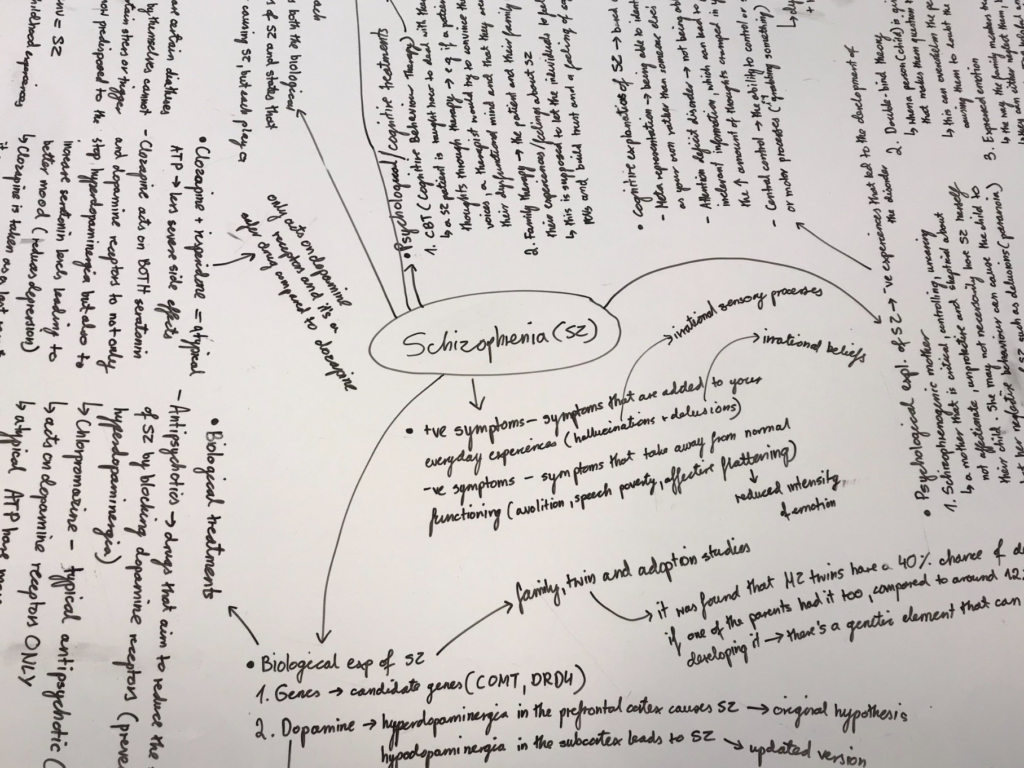

Another student shared their experience with us:
“The Wellbeing Hub offers a calming environment and the Wellbeing Lead has always been welcoming, helping me to feel less stressed. They’ve been able to support me better than any previous external counselling, simply by spending time with me and putting practical solutions in place to alleviate my concerns.”
Stacey shared her insights into being a Wellbeing Lead and, specifically, what she thinks works best when it comes to helping young people manage and reduce stress:
“I believe the best way to help my students is to begin by listening to them. It’s important to hear what they are trying to tell me. Listening allows me to see the areas that I need to focus on when sharing resources and providing support.
As an Integrative Practitioner, I find my experience with Cognitive Behavioural Therapy (CBT) very useful in tackling stress. CBT teaches you coping skills for dealing with different problems. It focuses on how your thoughts, beliefs and attitudes affect your feelings and actions. Mindfulness techniques can really complement this approach, e.g. guided meditation, breathing exercises, and body scanning.
For me, consistency is key, so I remind my students to keep a good routine: Organise your revision, get a good night’s sleep, eat healthily, and stay hydrated. Make sure you give yourself plenty of time on the day of the exam and take some time for yourself.”
Stacey’s students see the positive effect of having a dedicated Wellbeing Lead and a safe place, the Wellbeing Hub, in their school to support them on their journey through education and beyond. Some of them shared their thoughts about the wellbeing support and positive affirmations that help them thrive:
“Being in the Wellbeing Hub takes my mind off the stress of school.”
“I love wellbeing; it’s so good to just be.”
“I’d rather be happy than stressing over grades.”
“Fail to prepare, prepare to fail.”
“Big changes begin with small steps.”
3 workshop ideas to support students with stress
Catherine Llewellyn, a Clinical Supervisor at mdeducational foundation, works closely with our Wellbeing Leads to provide them with support and reinforcement. Our Clinical Supervisors also help create a pool of resources for the Wellbeing Leads to use as inspiration where needed – one of them being workshop ideas. Running workshops around various themes and topics is an important part of a Wellbeing Lead’s role in supporting students’ wellbeing.
Catherine, together with one of our Wellbeing Leads in Ireland, Grace McGee, share 3 practical workshop ideas below that schools can implement to help their students remember to focus on self-care and to help manage the stress and anxiety they might be feeling.


Workshop idea 1 – Relaxed Body Practice
During times of stress, it’s important to remind young people to prioritise self-care and find moments of calm amidst the chaos. The Relaxed Body Practice is a simple yet effective exercise designed to help alleviate tension and promote relaxation throughout the body.
By bringing awareness to different muscle groups and intentionally releasing the tension, this practice encourages a state of calm and tranquility, ultimately supporting students in managing exam stress and fostering a sense of wellbeing.
This workshop can be done individually or as an activity run by a wellbeing professional or another safe person. Start reading through the different steps and take time with each step, allowing students to fully engage with the sensations and feelings that arise. Additionally, for a more calming environment, you can play peaceful music and dim the lights to help concentration, promote relaxation and reduce stress.
Share the poster with students to encourage them to take time to relax their whole body when they feel stressed and need a moment to relax.
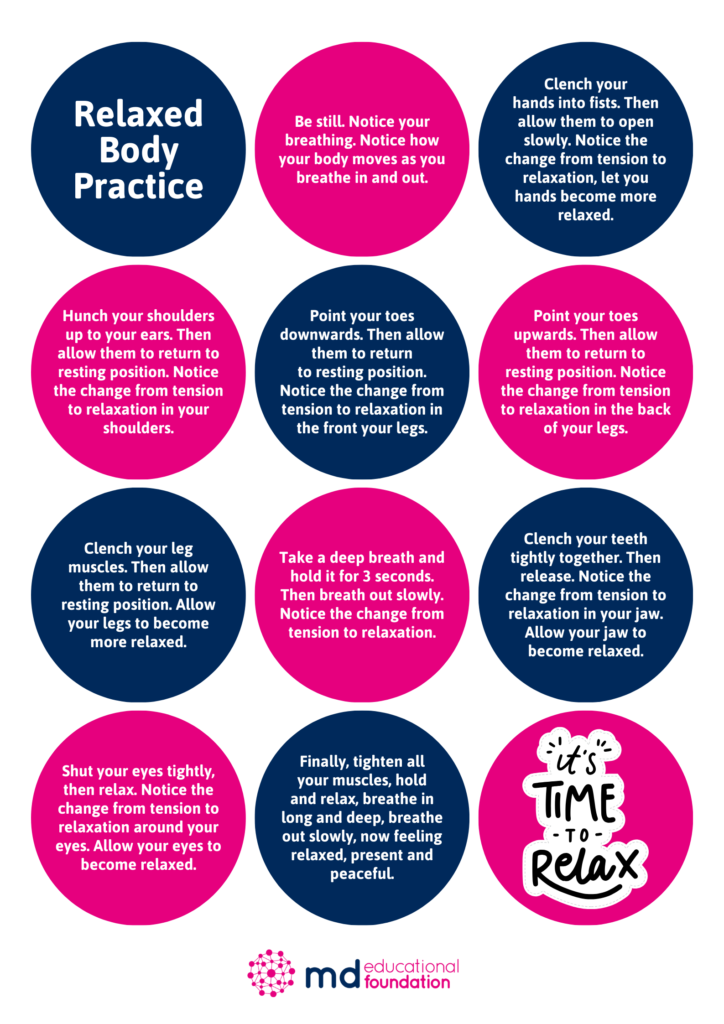
Workshop idea 2 – Value Yourself Visualisation
Stress can often make us feel worthless and forget about our incredible value. Value Yourself Visualisation workshop aims to promote self-compassion and appreciation by guiding young people through a journey of acknowledging and honouring their bodies and their functions. Similarly to Relaxed Body Practice, this workshop can be done individually or with another trusted individual and can be a powerful tool for cultivating self-love and gratitude.
Provide a quiet and comfortable space where young people can fully immerse themselves in the experience and connect with their bodies. Encourage young people to let go of any distractions or worries, and simply be present in the moment as they journey through their body with love and appreciation. Start reading through each level of self-value – getting deeper into thoughts of appreciation.
Share the poster with students to encourage them to prioritise their wellbeing and take moments to appreciate themselves, especially during times of stress. Let them know this practice is a valuable tool for fostering self-care and appreciation.
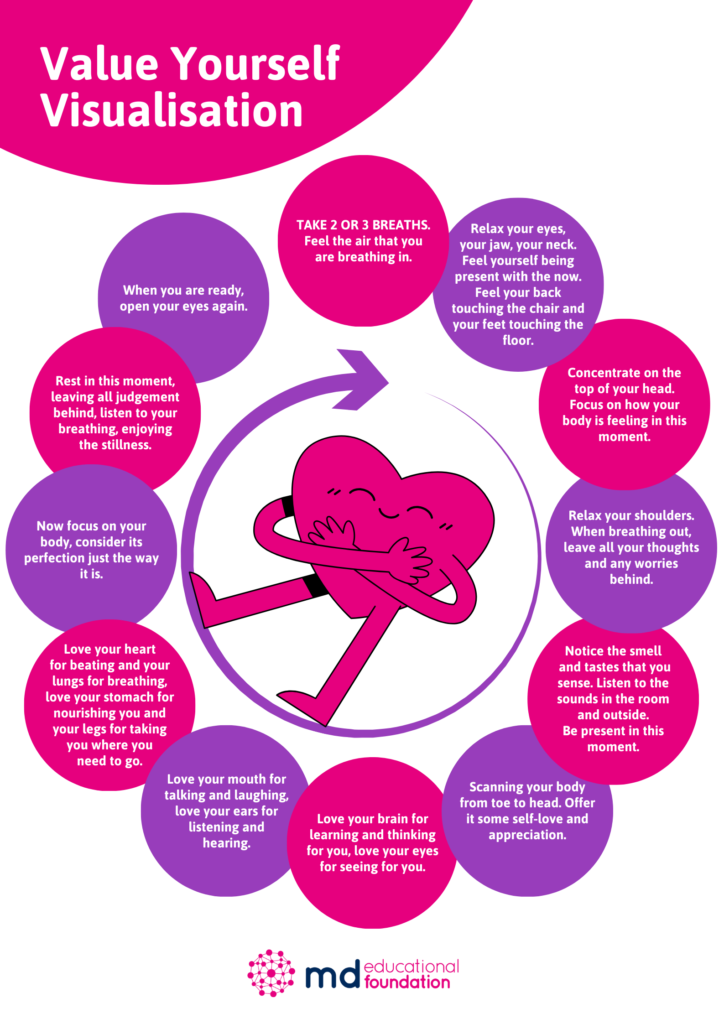
Workshop idea 3 – Pre-Exam Breakfast
Exam days can bring extra pressure and stress, and taking a moment to even breathe right before the exam can be challenging. Stress can make it difficult for students to want to eat properly, but starting the day with a nutritious meal can provide essential brain fuel and set a positive tone for the day ahead.
This session supports students during stressful exam mornings by providing them with a nourishing breakfast. It can help to give their nerves a little break and give them the chance to enjoy a nice breakfast with peers. This communal setting offers a supportive environment where students can ground themselves and receive last-minute tips and encouragement before they head off to their exam.
We at mdeducational foundation encourage our schools to set up Pre-Exam Breakfast sessions at their Wellbeing Hubs, led by their dedicated Wellbeing Leads, during the exam period. This way, their students have an opportunity to gather at a safe and calm place, enjoy a selection of breakfast items, and connect with their peers and Wellbeing Lead.
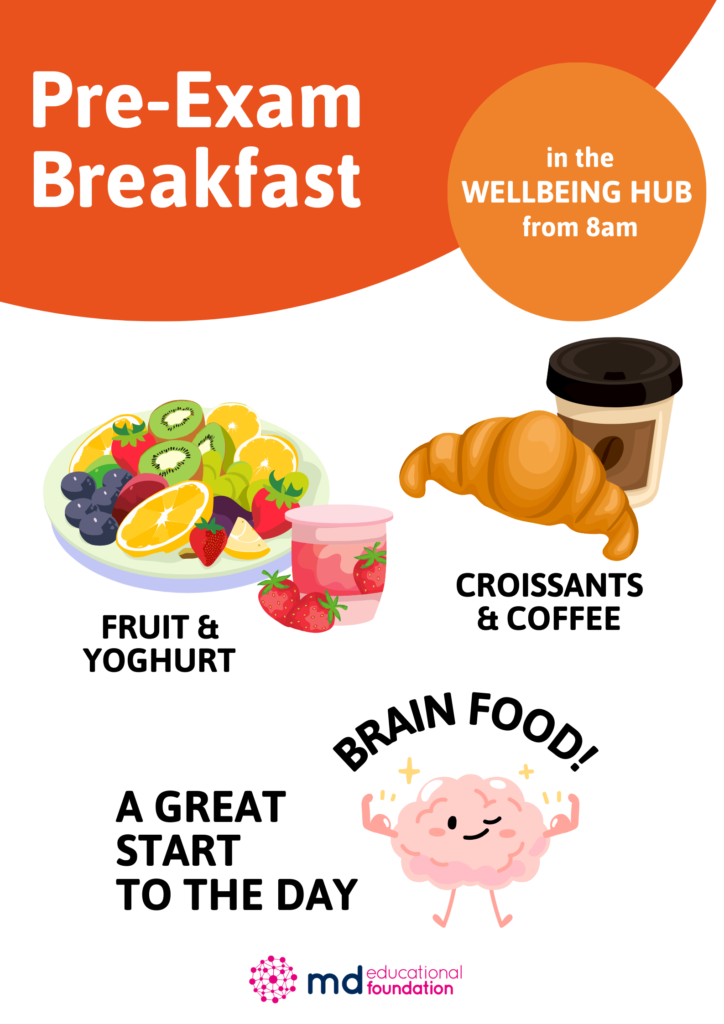
Our Clinical Supervisors and Wellbeing Leads at mdeducational foundation have shared many more wellbeing workshop ideas in previous blogs. Explore more workshop ideas that schools and educational settings can use to improve student wellbeing and mental health here.
How will we continue to help students with stress and anxiety?
Supporting students with stress and anxiety doesn’t just last for exam season. It’s essential to provide students with tools and resources to understand and manage their stress in the future as well. By doing this, we can help young people thrive and become more resilient and able to handle whatever life throws at them.
Our student testimonials reflect the impact that our Wellbeing Leads have on young people. From understanding how they experience stress to providing strategies to help manage it. It proves that having a dedicated wellbeing professional in an educational setting to normalise student psychological fitness and resilience is beneficial for students. This is why we remain committed to prioritising student wellbeing, collaborating with schools, and advocating to build a movement towards positive lasting change.
With thousands of students already supported across the UK and Ireland, mdeducational foundation will continue our mission to make all post-16 students feel supported in every aspect of their wellbeing, helping them on their journey to a brighter future. With our funding, Wellbeing Leads keep supporting young people’s wellbeing needs – through education and beyond.
Prioritising student wellbeing through education and beyond
mdeducational foundation is a charity that provides a three-year salary-funded commitment to placing dedicated wellbeing professionals within educational settings, enabling them to kickstart their long-term wellbeing strategies.
Related posts
Championing student wellbeing: Meet James Sweeney, the first mdeducational foundation Ambassador
At mdeducational foundation, we’re committed to prioritising student wellbeing - and now, we’re continuing that mission by inviting members of our community to join us in championing a brighter future for young people. We’re [...]
6 mental health workshops to support and improve the wellbeing of young people in schools
Wellbeing workshops are a great way to promote positive wellbeing, encourage young people to look after their mental health and remove the stigma around mental health and wellbeing. In schools, workshops can provide many [...]
Shining the spotlight on student wellbeing: Meet Susanna Neuvonen, Marketing Executive at mdeducational foundation
At mdeducational foundation, we’re dedicated to prioritising student wellbeing by providing fully funded support in schools and educational settings across the UK and Ireland. Our mission is to ensure that all post-16 students feel supported [...]

